Burkina Faso’s military government has officially dissolved the country’s independent electoral commission, citing high costs and the need to assert greater national sovereignty over the electoral process. The move, announced via state-run broadcaster RTB, transfers the responsibility for managing future elections to the Ministry of the Interior.
The announcement has drawn sharp criticism from civil society and opposition figures, who warn that the step further entrenches military rule and undermines the already fragile democratic transition in the conflict-ridden West African nation.
Junta Tightens Control on Electoral Process
According to Territorial Administration Minister Emile Zerbo, the electoral commission had become a “waste of resources”, costing the state approximately $870,000 (about KSh 112 million) annually in subsidies. “Abolishing the commission will reinforce our sovereign control on the electoral process and at the same time limit foreign influences,” Zerbo was quoted as saying by AFP.
This institutional overhaul follows a series of reforms by Captain Ibrahim Traoré, who led a military coup in September 2022, ousting the civilian leadership over what he described as its failure to combat a growing Islamist insurgency.
In 2023, the junta postponed the general elections that were scheduled to return the country to civilian rule. The military government has since extended the transitional period until July 2029, giving Traoré a legal path to contest the next presidential election and potentially maintain his hold on power for at least another five years.
Regional Implications and Democratic Setback
The disbanding of Burkina Faso’s electoral commission is likely to raise concerns within the Economic Community of West African States (ECOWAS), which has been monitoring democratic backsliding in the Sahel region. Similar coups in Mali and Niger have seen elected governments replaced with military juntas that have delayed or cancelled planned elections.
Observers say the elimination of the independent election body may severely impact transparency and credibility in future votes, as the Interior Ministry is seen as being directly under executive control.
“This is a dangerous precedent that removes institutional checks and balances from the electoral process,” said a Burkina Faso-based constitutional expert, who requested anonymity for security reasons. “Free and fair elections are nearly impossible without an impartial referee.”
War on Terror and Foreign Realignment
When the junta took over in 2022, it promised to stabilize the country and defeat Islamist insurgents who control large parts of northern and eastern Burkina Faso. However, recent figures suggest the situation is deteriorating.
According to data verified by the BBC, jihadist group JNIM (Jama’at Nusrat al-Islam wal-Muslimin) claimed responsibility for over 280 attacks in the first half of 2025 alone — nearly double the number during the same period in 2024.
Despite these challenges, the junta has cut ties with France, its former colonial power, and turned to Russia for military and political support, including deploying paramilitary contractors from the Wagner Group.
Rights Violations and Repression
Meanwhile, human rights organizations have raised alarm over the conduct of the Burkinabe military. Local and international groups accuse the armed forces of indiscriminately targeting civilians during counterinsurgency operations. The government has also been accused of suppressing political dissent, curbing media freedom, and banning public demonstrations.
“Since the junta came to power, there’s been a clear pattern of silencing critics and neutralizing institutions that could limit its authority,” said a regional representative from Human Rights Watch.
With the electoral commission now disbanded, civil society activists warn that Burkina Faso risks sliding deeper into authoritarian rule, with no clear path back to democratic governance.
Outlook: Democracy Deferred
As of now, the military has not provided a detailed framework for how the Ministry of the Interior will conduct future elections, nor has it committed to independent oversight mechanisms. The decision to dismantle the electoral commission — long viewed as a key pillar of the country’s democratic architecture — signals a shift toward centralized authoritarianism, critics argue.
With insecurity rising and political freedoms shrinking, the future of democracy in Burkina Faso appears increasingly uncertain.


